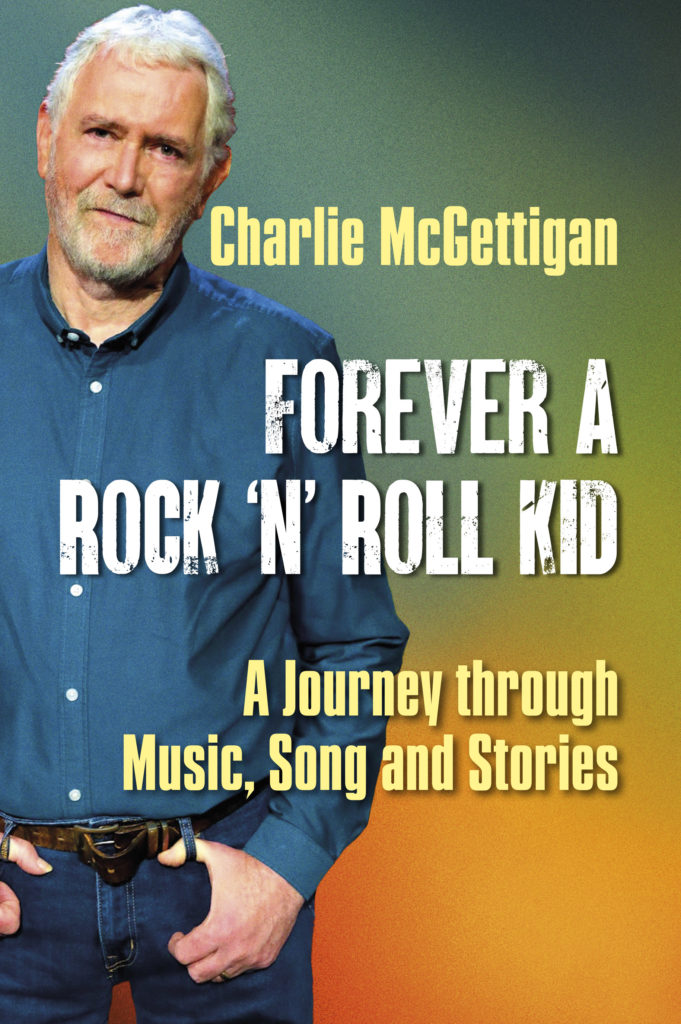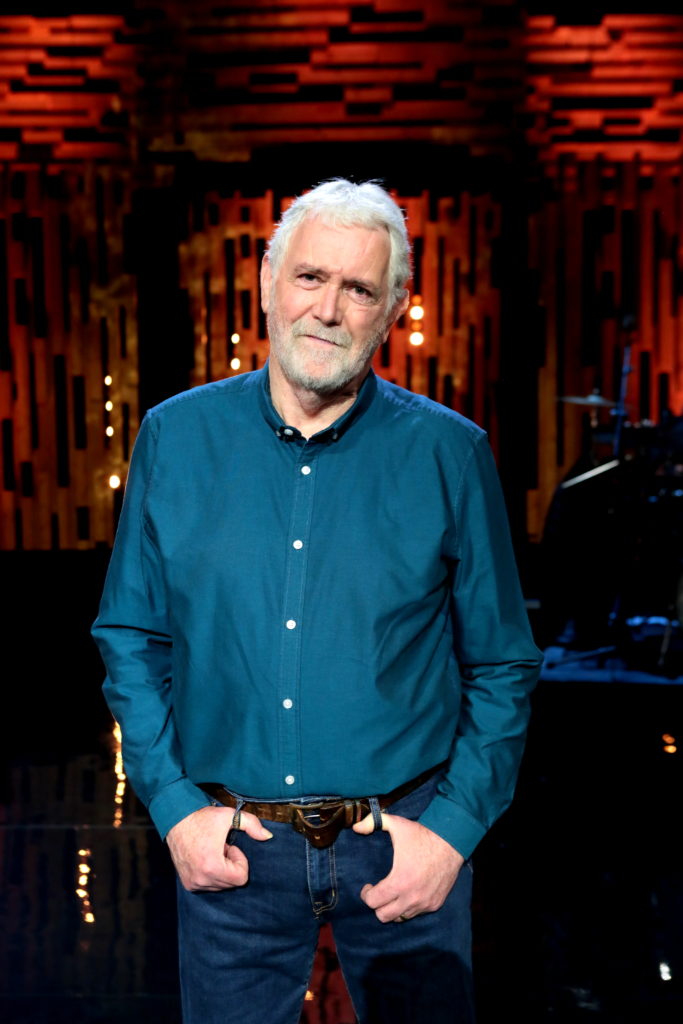CHARLIE McGETTIGAN is one of Ireland’s prized possessions – a Eurovision Song Contest winner who is still making music and pleasing crowds nearly three decades later. Following the release of his first book, he tells FIONA AUDLEY why he loves his craft and how to write a winning song…
IT’S been 28 years since Charlie McGettigan won the Eurovision Song Contest.
The Dublin-born singer/songwriter is still in the business and remains a devoted fan of the contest which cemented his place in Ireland’s musical legacy.
Born in Dublin, but largely raised in Ballyshannon, Co. Donegal, McGettigan had already carved out a successful music career when he found Eurovision fame with Paul Harrington in 1994.
The pair joined forces to represent their country that year. They sang Rock n Roll Kids by Brendan Graham and they won.
It was another high in the golden years of Ireland’s Eurovision history, which saw them become the third consecutive Irish winner of the international competition.
It was a high point for McGettigan too, but only one in a long line of musical achievements made over the years.
His musical career first began in the 1960s, in various Donegal-based rock bands.
A move to Dublin in 1968 saw him home in on the thriving folk scene which existed there at the time.
In 1973 he formed the highly successful group Jargon, which went on to win the prestigious Letterkenny Folk Festival, following in the footsteps of bands like Clannad and Pumpkinhead.
So much has happened in his lengthy career, in fact, that McGettigan - who to date has penned more than 1,000 songs - has found time to document it in book form.
He has just released Forever a Rock ‘N’ Roll Kid, the first instalment of his memoirs, with a second already on the horizon.
McGettigan admits that he had no idea what he would write when he first put pen to paper, but a little musical inspiration showed him the way.
“When I decided to write the book, I didn’t really know how I was going to do it, I had never put a pen to paper to write a book, although I had written loads of songs,” he told The Irish Post.
“So, I thought about what was the first piece of music that I remembered hearing and it turned out to be a tune called O'Donnell Abú. It was the signature tune for Radio Éireann back when I was young, what is now RTÉ Radio, and that used to play for three minutes every morning before the station was open. Then I thought about where I would have been when I was listening to that,” he added, “which was Dublin, but then we moved to Ballyshannon in about 1953 or 1954, and then the book really talks about what it was like living in a small town, the characters, the people, the way of life.”
McGettigan explains that his book, full title Forever a Rock ‘N’ Roll Kid: A Journey through Music, Song and Stories, quickly became much more than a biography once he sat down to write it.
“Finding that first piece of music triggered a whole lot of memories that literally must have been lying dormant in my head for so many years,” he explains. “And I began to realise that what I was writing was actually a personal, social history of the 1970s, 80s and 90s in Ireland.”

McGettigan was born in Dublin but moved to Ballyshannon with his family at the age of four.
As such he spent his formative years living in a small town, with a population of just 2,000 people, something he says he has fond memories of.
“We had fantastic characters back then,” he admits. “I remember the first fella to get a TV in our town, and everybody used to go to his house to watch it, although you could barely see anything on it. It was just this hazy black and white TV and he used to call it ‘her’ all the time.
“Like ‘there was great stuff on her last night’, you know, like it was a tractor or a bicycle. Any kind of piece of machinery back then was always called ‘her’. So, I found myself thinking a lot about things like that, the kind of innocence of those days, what summers were like, what Christmas was like, those sorts of things.”
Such thoughts soon led McGettigan to start thinking about his start in the industry, and where the inspiration to play music first came from.
“My mother was a big fan of the Theatre Royal in Dublin, she would always talk about it, she was always listening to the radio too, music on the radio, particularly on a Sunday evening,” he recalls.
“My mum sang around the house all the time, but as for formal musicianship there was no such thing as that in our house. I saw a guitar for the first time on a postcard of the Everly Brothers,” he admits. “They were playing these two black Gibson guitars and I thought ‘wow, they look so cool’.
“My dad used to tune into Radio Luxemburg on a Sunday night too, and I would hear all this pop music on it.
“The first one I remember was called Venus in Blue Jeans, a song by Mark Wynter.
“One night I heard a guitar instrumental version of it, and I remember thinking ‘what is that?’.”
It was that experience that furthered his interest in the instrument, McGettigan admits, although he would have to wait a few years before he could get his hands on one. “Hearing that got me into guitar playing,” he explains. “I had never touched one, but there was one in the window of a shop in Ballyshannon back then and every day after school I would go there and stare at this beautiful guitar through the window.
“Of course, one day it was gone, but the fella who bought it did let me look at it and strum it,” he adds.
“So that was my start. That led me to being part of little beat groups, which is what we used to call it in those days. Groups like The Kinks, The Beatles and The Rolling Stones, they were beat groups, and the bands were showbands. We didn’t like the showbands, we were totally cool, we had to be cool,” he laughs.
“They were the two sections at the time, beat groups and showbands and never the two should meet.”
McGettigan’s rock roots remain with him today, he claims, as he is a lifelong Beatles fan.
“To this day The Beatles are still an obsession with me, I never tire of finding out things about them,” he says.
“I feel so lucky, in fact, that I grew up at a time when The Beatles were making music.”
McGettigan was 12 when he first got his own guitar.
“It was one of the worst guitars,” he admits, “but I struggled and struggled and learnt how to play it. You got better guitars as time went on.”
And while he has steadily honed his craft and carved out a successful career since then, the musician admits his Eurovision success with Paul Harrington was particularly special as he has always been a fan of the contest.
And this book, which is the first of at least two that McGettigan has planned, comes to its conclusion with that win.

“I think the book could be subtitled ‘How to Win the Eurovision after 30 years of Trying’,” he says “as back in 1964 I said ‘some day I am going to win that thing’ – I was always a big fan.
“Particularly, it was a big achievement for us because we got to represent the country.
“We were happy to do the show, to just do that, we had no thoughts about winning,” he explains. We were just two old buggers with beards, not the kind of people that won the Eurovision song contest.
“We did it with just a piano and a guitar and two vocals, we had no orchestra or any other type of backing, there was no such thing as backing tracks or anything like that for us in those days.
“We were just doing what we do, singing and playing guitar, and it was a joy to win it that way.”
McGettigan admits that even after the win the pair were not fazed by their sudden rise to international stardom.
“Paul and myself came from the school of hard knocks, so the win didn’t faze us at all really,” he says. “In fact, the three minutes of singing in the Eurovision, to 300 million people around the world, was the most at ease I have ever been while singing, because we were just doing what we did,” he explains.
“We had a long career behind us, of television performances, radio, recording, so it was just a slightly more important gig that we were doing, you know, representing the country.”
So, is he still a fan of the competition?
“Yes. Myself and my wife still follow the Eurovision,” he says, “we have our battles about who is going to win and what have you. I love the spectacle of it,” he explains, “and what I think has really revitalised the interest in the Eurovision is the fact that Britain will be hosting it next year.”
McGettigan understands the “general disillusionment” with the competition in Britain in recent years “as they have literally done abysmally” but believes this year’s British entry Sam Ryder – who came second to Ukraine with his hit Spaceman – marks a turnaround for the nation.
“He is what Eurovision is all about,” he says. “He sings a great song; he looks great and has a great personality. And now the competition will be back in England again and people are talking about it and loving the fact that it is happening in Liverpool,” he adds.
“I just wonder if Macca [Paul McCartney] will make an appearance.
“That would give the contest the seal of approval for the rest of my life,” he laughs, ‘it would be brilliant.”
So, what advice would McGettigan give anyone hoping to write a winning song for the Eurovision contest?
“One of the things you need to pay attention to when making music is diction, particularly in things like Eurovision,” he says.
“The essential element is the lyrics, the lyric has to be able to be sung, you will always remember a good lyric and a song title.”
He adds: “When you write songs, I spend a lot of time doing lyrics and just getting them to sing right.
“It’s grand to be able to read them on the page, but if you don’t get them to sing right, they don’t trip off your tongue properly, then you are in trouble. So, I always stress to anyone writing songs to make sure that it can be sung right.
“Also, don’t think Eurovision, just think good song. That’s the advice I would give anyone - don’t write a Eurovision song just write a good song.
“When we got [Brendan Graham’s] Rock n Roll Kids, for me it’s one of the greatest songs and we were so lucky to get it, but it told a simple story.
“To this day when Paul and I sing it, the entire audience know it, they can sing every word of it. It’s the power of simplicity and it’s not necessarily the easiest thing to get. You really have to struggle to be simple sometimes.”
Forever A Rock ‘N’ Roll Kid: A Journey through Music, Song and Stories, published by Battlebridge Press, is available in bookshops and online stores
HEAR THE MUSIC
Charlie McGettigan’s book Forever A Rock ‘N’ Roll Kid features the lyrics to 26 of his songs.
Beside each one is a QR code, so you can scan the code with your phone and listen to the music while you read.

